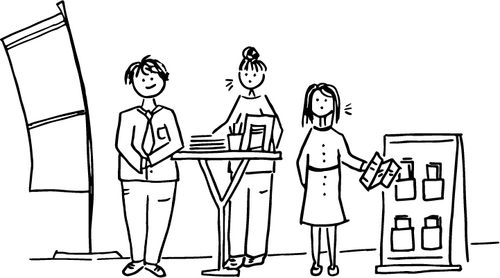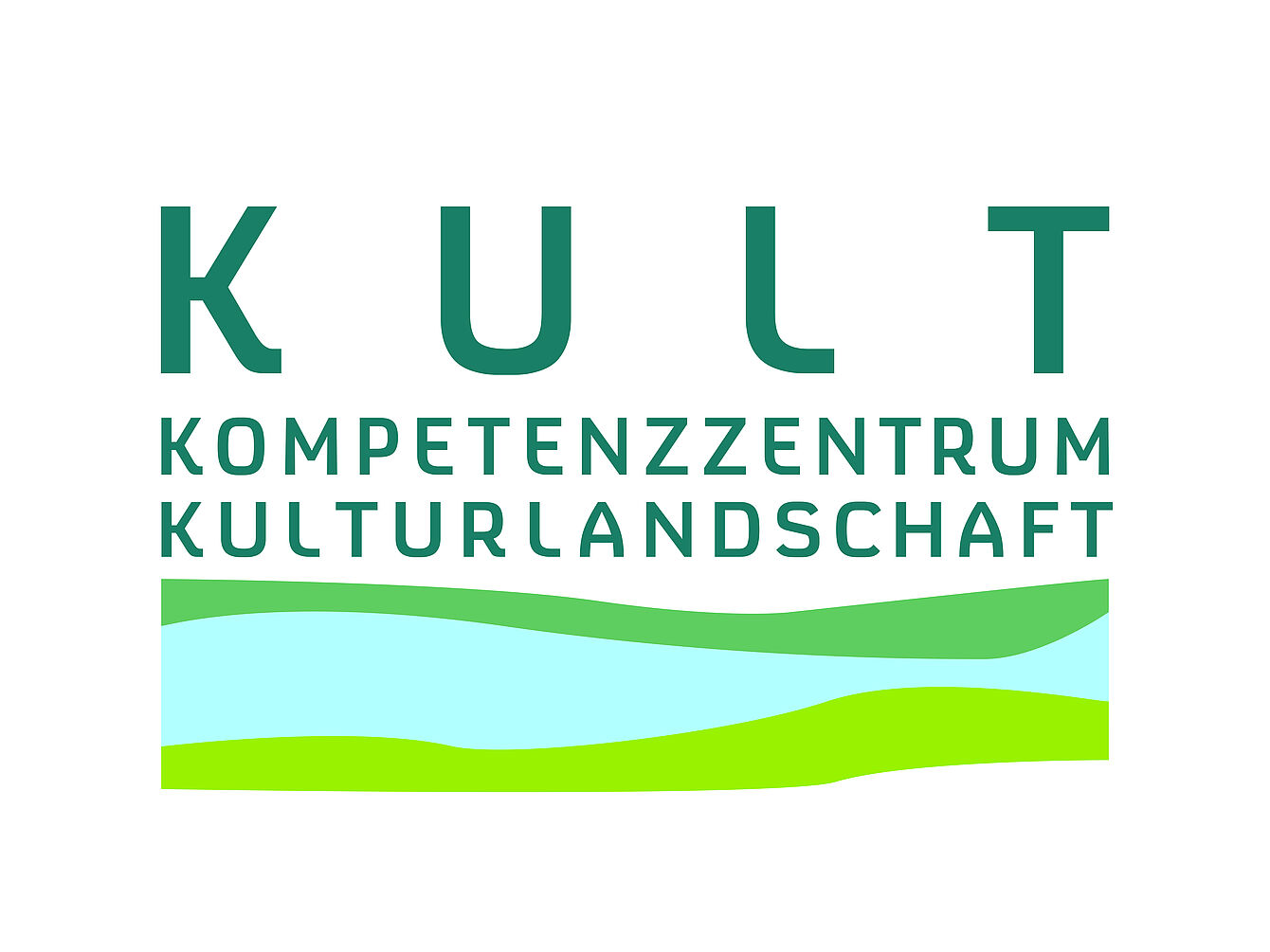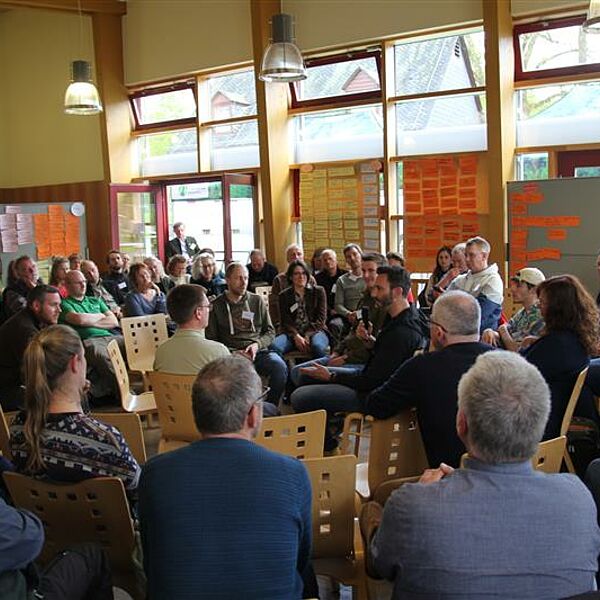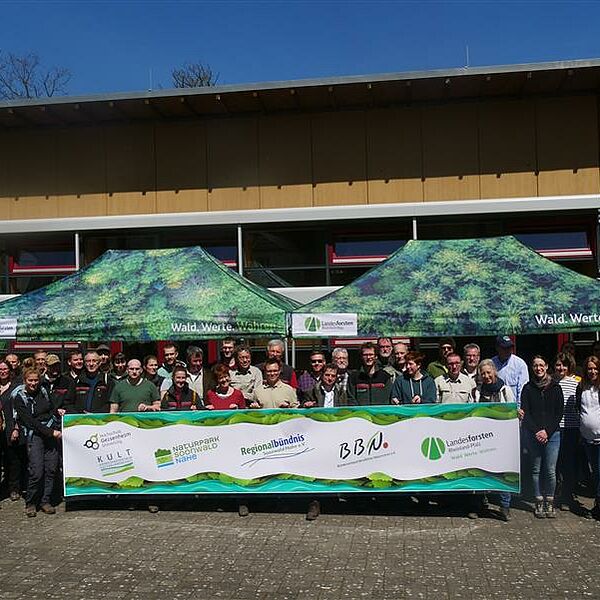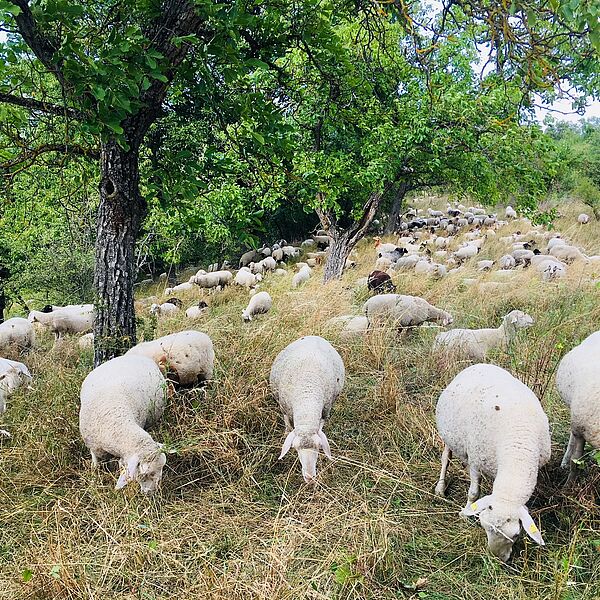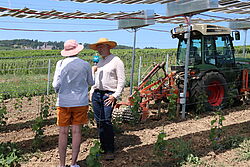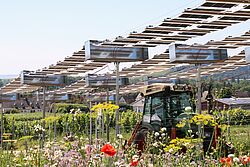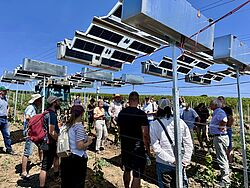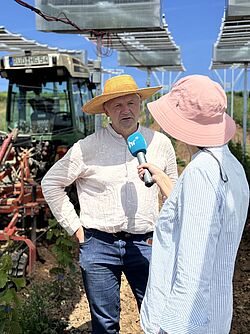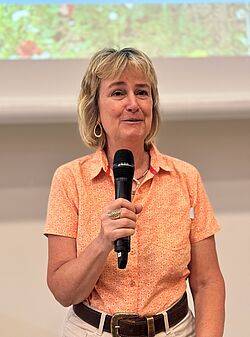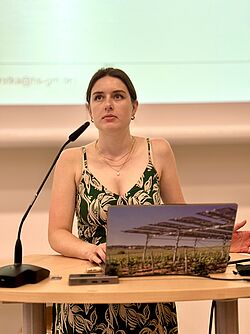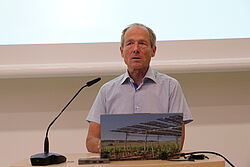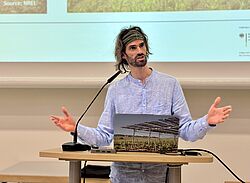VitiVoltaic, a stationary, raised agrivoltaic system with movable, semi-transparent modules, has been undergoing testing since March 2023. Now, as of June 2024, there is also a new addition to the agrivoltaic family: VitiCULT, a prototype mobile agrivoltaic system for newly planted areas, featuring retractable modules and a standard support system.
Diverse Presentations by Project Partners
Dr. Max Trommsdorff, Head of the Agrivoltaics Group at the Fraunhofer Institute for Solar Energy Systems ISE, held a presentation on the current state of affairs for agrivoltaics research and development in Germany and around the world. He emphasized how diverse argivoltaic equipment and systems can be, ranging from vertical fence systems to semi-transparent, raised modules. He also discussed current funding and approval procedures in the field.
The idea to build a real-world agrivoltaics laboratory in Geisenheim was first inspired by a lecture held by Dr. Trommsdorff in 2018. Professor Manfred Stoll, Professor Claudia Kammann, and Dr. Trommsdorff subsequently worked together to transform their vision for this innovative facility into a reality.
Dr. Stoll, Head of the Department for General and Organic Viticulture and Professor of General Viticulture at Hochschule Geisenheim University, and Dr. Kammann, Professor of Research into Climate Effects on Special Crops, held a presentation on the journey to constructing the VitiVoltaic research facility. PhD student Lucía Garstka also presented the results of the first year of research.
sbp sonne gmbh’s Thomas Keck then concluded the presentations by discussing the design and construction of the VitiCULT system. The VitiCULT prototype was developed and installed last year by the project team, which comprised Thomas Keck, Christian Weinmann (sbp), Manfred Stoll and Claudia Kammann (HGU), Sebastian Gölz, Max Trommsdorff and Julia Wamseler (Fraunhofer ISE).
After the presentations, Geisenheim representatives invited the audience to take a walk or a bike ride to view the installations onsite. The project team, which included representatives from Hochschule Geisenheim University, Fraunhofer ISE and sbp sonne gmbh, remained available for further questions.
Both Subprojects at a Glance
- Stationary Agrivoltaic System: VitiVoltaic – the advantages:
- The system provides cooler temperatures during the day and warmer temperatures at night, as well as increased soil moisture.
- Grapevines adapt to the changed light conditions and develop larger leaf areas.
- Young vines grow better and form longer, stronger shoots in the first year.
- Grapes have lower rates of rotting and sunburn damage.
- Mobile Agrivoltaic System: VitiCULT – the advantages:
- The prototype is built on existing row stakes, rather than an extensive substructure.
- Stability is achieved through tension, and the APV modules, which are laminated onto foils, can be retracted into their housing in high winds.
- The system can be easily dismantled and installed in another area.
- The system protects young vines from excessive sun and aridity, and is designed to improve growth success in the face of climate change.
Further information is available here: https://www.hs-geisenheim.de/agri-photovoltaik/
More on VitiCULT
Hochschule Geisenheim University has put an innovative mobile agrivoltaic system into operation. The VitiCULT PV-mobil pilot project, which is funded by the German Federal Ministry of Education and Research (BMBF), uses a simple design to enable solar power generation within an area planted with grapevines.
The system offers shade to newly planted vines and can be set up without the need for major construction measures. If there are strong winds, the system's modules can be automatically retracted into a protective housing. The concept for this new system was developed with the goal to protect new plants, which can struggle to establish themselves in hot, dry conditions. The modular, lightweight design is intended to allow the system to be dismantled and moved to a new site simply and easily.
Hochschule Geisenheim University, the Fraunhofer Institute for Solar Energy Systems ISE, and sbp sonne gmbh are working on the project in close collaboration. Fraunhofer ISE, Europe's largest research institute for solar energy, developed the idea of agrivoltaics. sbp sonne gmbh, an internationally active solar energy and structural engineering company, is contributing its expertise to the system's technical design and construction. Hochschule Geisenheim University is providing expertise in the field of viticulture, with the university's unique combination of basic research and practice-oriented studies.
VitiCULT is being supported as part of a joint project for energy efficiency and climate protection under the BMBF’s KMU-innovativ funding measure. The goal is to promote integrated solutions for climate resilience, energy transition and plant protection, and thereby strengthen the sustainability of cultural landscapes.

